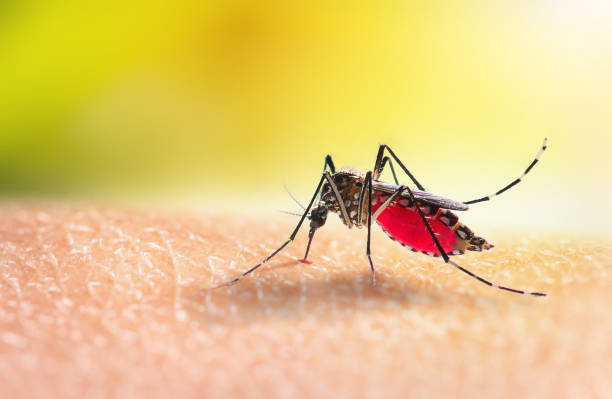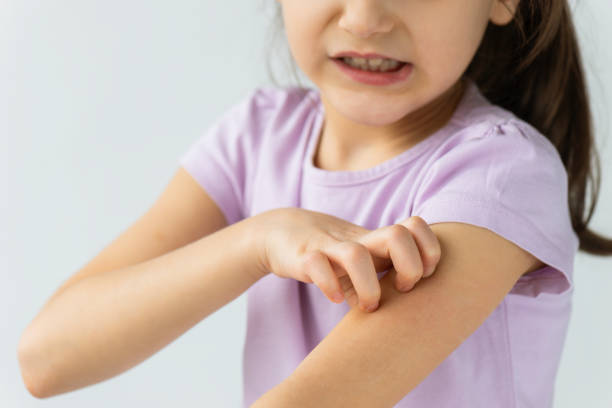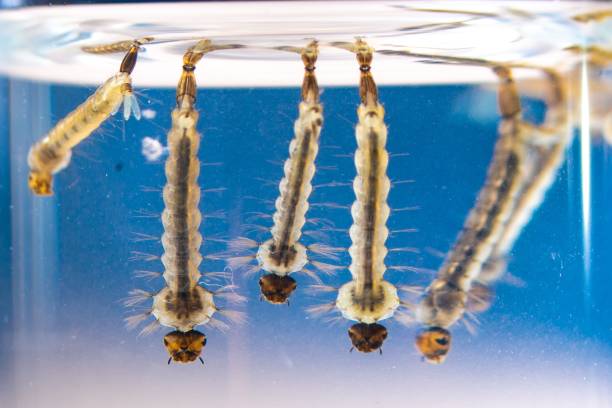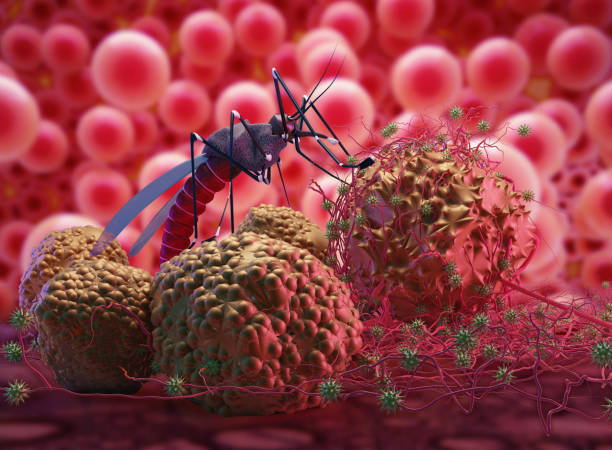Female mosquito: Everything you need to know

When summer arrives, not only the heat arrives, but also the annoying mosquitoes. They bother us when we are about to go to sleep or when we are quietly on our terrace enjoying the coolness of the night. Although among the mosquitoes, the one that causes the most problems is the female mosquito.
There are a total of 3,500 species of mosquitoes worldwide, although some are more annoying than others. And a few of them can even transmit worrying diseases such as Dengue or Zika.
In this article we will tell you everything you need to know about the female mosquito.
Information on mosquitoes
Mosquitoes are insects of the Diptera family, also known as mosquitoes. Today, it is estimated that there are 3,500 species living on a large part of the planet.
They are characterized by an elongated and slender body, as well as a size that does not exceed 15 mm length. In addition, they usually have a short life cycle of 10 to 30 days (depending on sex, food, area and other factors).
It is also important to point out other defining elements of these insects in order to better understand them:
- They can bite both during the day and at night (depending on the species).
- Adults live outdoors and indoors.
- Females tend to live longer than males.
- Only females bite people and other animals to draw blood.
- When they bite, they can inoculate microbes, viruses and parasites.
Why and how do female mosquitoes bite?
It's a pretty straightforward question: only female mosquitoes bite because they need the blood, not to feed themselves, but in order to be able to lay eggs. Moreover, both males and females feed on flower nectar and other sweeteners.
But in order for a female to can lay eggsThe nectar diet is very energetic, but it does not have enough proteins (amino acids) and other compounds to generate eggs (ovogenesis). The main reason is that, although the nectar diet is very energetic, it does not have enough proteins (amino acids) and other compounds to generate eggs (ovogenesis).
We all know how they bite. The female mosquito begins to feed after landing on a person's skin. Its mouthparts made up of 6 needles or tubes and sharp bristles open a hole in the skin until it finds a blood vessel. It will then suck out the blood.
Why this dependence on blood as opposed to other female insects?
Mosquitoes have 2 major life stages: the larval stage (egg, larva and pupa) and the adult stage. The adult will depend on its life as a larva, normally aquatic and adapting according to the conditions of its habitat, water.
They develop rapidly in just a few days and make efficient use of the nutrients at hand, whether in a puddle or in the waste water of a pot. But the adult, on the other hand, after its metamorphosis, has hardly any nutrients on its organism amino acids or nutrientsYou will have to choose to obtain them in another way.
Although it should be noted that blood is a food that is not balanced, it does not have the same levels of components, depending on the person. It has protein and ironThe latter is necessary for the female to lay eggs and is not good in high quantities. But for that, the female is also prepared, since she has a mechanism that neutralizes the Fe ion and eliminates excess Fe ion.

Reason for female mosquito bite itching
The vertebrate organism has efficient mechanisms to prevent any form of blood loss. And that, to warn of a problem in the body, it hurts and stings.
But a female mosquito's biting apparatus is so small that it can evolutionary perfected that its sting is more subtle than a clinical needle. The stinging stings because not only the skin is pierced and blood is extracted, but also because saliva is injected before suctioning. This intrusion of something foreign to the body causes a reaction in the organism or pruritus, even causing a allergic reaction serious in sensitive people and if there are several stings.
Its saliva is prepared to counteract the body's defensive reactions and it contains anticoagulant and vasodilator principles to stop blood flow. There are also some species that inoculate anesthetic substances.
Longer life cycle than male mosquitoes
Insects, especially mosquitoes, are very numerous and their presence is due to their rapid colonization of habitats, ability to adapt and a life cycle short. As a general rule, mosquitoes have a short life between 10 to 30 daysalthough this may vary depending on humidity, diet, sex, time of year and species.
Generally, females have a longer life than malesTheir life cycle is extended because they have to lay several clutches of eggs. It is estimated that during their lifetime they are capable of laying up to three clutches and stinging animals on several occasions.
Before the hibernation periodThe females feed on nectar to nourish themselves throughout this process, apart from sheltering in protected places. In other words, females have the ability to hibernate, while males die.

Fun facts about female mosquitoes
Now that we know the general facts about how female mosquitoes feed, grow and drink blood, let's detail some curious facts you probably didn't know.
Mosquitoes grow fast
And they don't just grow fast. For example, the mosquito species Aedes aegypti can make up to 100 eggs at a time. These insects have a life cycle where they mature very quickly. Following the example of the Aedes, from egg to adult lasts only 7 to 10 days.
Female mosquitoes have voracious appetites
The amount of blood they suck may vary according to the species and size of the mosquito. However, there are specimens of female mosquitoes that may reach drink your entire body weight in the blood during a meal. To give a simple example, it is as if a 60 kg person ate 60 kg of food during a meal.
Some people are more likely to be stung than others.
It can happen that we get bitten a lot by mosquitoes but someone next to us does not get bitten at all. And there is an explanation for this.
The mosquitoes are attracted by the combination of body heat, carbon dioxide, odor and animals, and the lactic acid present in perspiration. These stinging insects use receptors and vision to find victims and that helps them detect their next meal from 50 meters distance.
Female mosquitoes are most active during a full moon.
Culturally, the moon is associated with strange occurrences and certain behaviors in animals and people. But in this case, it has been shown that a full moon can increase the activity of female mosquitoes by 500%. That's because mosquitoes use visual cues to locate their next meal, which is easier when the moon is full.
Mosquitoes can reproduce in small amounts of water
Females can lay their eggs in standing water or moist soil and require only a minimal amount of water to do so. In fact, there are mosquitoes that can breed in less than a teaspoon of water.
Color is important
After feeding on blood, females hide in dark places to hide and digest their food. For this reason, they often perch on people wearing dark clothing (although they will not bite because they have already fed).
On the contrary, they are guided by contrasting colors for feeding, since they are easier to see and they are attracted to them.

What diseases can a female mosquito spread?
It should be noted that not all female mosquitoes transmit viruses or parasites. Those that transmit malaria, dengue or yellow fever do so once they have fed on blood.
Some diseases transmitted by mosquitoes:
- Dengue. Viral infection that causes high fever, headache, joint pain, vomiting and rash. It gets better after several weeks. In severe cases it can be life threatening.
- Malaria. A parasitic disease that produces severe symptoms that may resemble the flu. It can lead to death, but there are treatments to cure it.
- West Nile Virus. Viral infection that usually has no symptoms and, if any, may be mild (fever, headache or nausea). Rarely, it enters the brain and can be fatal.
- Zika. 1 in 5 people suffer symptoms which are usually mild (fever, rash, joint pain or conjunctivitis). In contrast to the previous diseases, the mother can transmit the disease to the baby during pregnancy.
So far we have told you all about the female mosquitoes. As we have seen, blood is not only a question of food or the desire to bite for the sake of biting, but also of propagation of their species, and they tend to last longer than males. To avoid getting bitten by a female mosquito, you can use the different mosquito nets we offer you.

